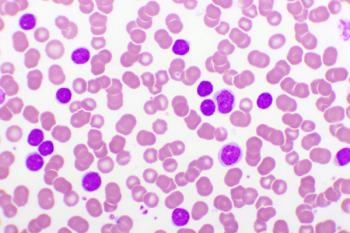
Improvement in overall survival (OS) for patients with metastatic non–clear cell renal cell carcinoma (RCC) was linked with first-line treatment using immune checkpoint inhibitor–based regimens versus select targeted therapies

Your AI-Trained Oncology Knowledge Connection!


Improvement in overall survival (OS) for patients with metastatic non–clear cell renal cell carcinoma (RCC) was linked with first-line treatment using immune checkpoint inhibitor–based regimens versus select targeted therapies

No significant activity or favorable toxicity profile was found with sapanisertib when treating patients with refractory mRCC regardless of mTOR or PTEN status.

High response rates with novel eganelisib plus PD-1 inhibition is reported in patients with metastatic urothelial carcinoma, especially those with low PD-L1 expression.

Based on an exploratory analysis of a phase 2 trial, lenvatinib plus everolimus appears to be an acceptable treatment option for patients receiving prior immunotherapy for clear cell renal cell carcinoma.

Seagen and Genmab hope to receive accelerated approval from the FDA for tisotumab vedotin monotherapy as treatment for patients with cervical cancer in the recurrent or metastatic setting.

First-line treatment with nivolumab plus ipilimumab showed a moderate improvement in overall survival and a manageable safety profile in patients with metastatic uveal melanoma.

The hospitalist at Memorial Sloan Kettering Cancer Center discussed what she believes is most important for practicing oncologists to understand about a study of 177Lu-DOTATATE in well-differentiated, high-grade neuroendocrine tumors.

Data regarding patients with previous Hodgkin lymphoma and primary myelofibrosis diagnoses found associations with subsequent diagnosis of multiple myeloma.

OmniSeq is partnering with the University of Pittsburgh Medical Center to employ a gene expression assay investigating the potential for personalized immunotherapy combinations for patients with head and neck squamous cell carcinoma.

Data in The Lancet promoted a tolerable safety profile and future feasibility of UCART19 administration among patients with relapsed and refractory B cell ALL.

The KEYNOTE-799 study is evaluating pembrolizumab plus concurrent chemoradiation therapy in patients with unresectable, locally advanced, stage III non–small cell lung cancer.

The FDA has granted breakthrough therapy designation to asciminib for the treatment of adult patients with Philadelphia chromosome–positive chronic myeloid leukemia in chronic phase who have been previously treated with 2 or more tyrosine kinase inhibitors; or who harbor the T315I mutation.

The PD-1 inhibitor cemiplimab was granted approval in patients with advanced basal cell carcinoma previously treated with a hedgehog pathway inhibitor or for whom these therapies are not appropriate.

Per a planned interim superiority analysis conducted by an independent data monitoring committee, a trial of Eryaspace will continue without modification with final results anticipated later this year.

Investigators suggest that results of a study may help to identify concerns of individuals undergoing panel testing and ways to support their needs.

Research in the Journal of Clinical Oncology found an association between the combination of daratumumab, lenalidomide, and dexamethasone with improved patient-reported outcomes versus lenalidomide and dexamethasone alone.

The chief of urologic oncology at City of Hope spoke about how the COVID-19 pandemic has altered the way he cares for patients with cancer as well as how he believes it will continue to impact cancer prevention, detection, and treatment moving forward.

Findings from a poster presentation at the 2021 Transplantation and Cellular Therapy Meetings of ASTCT and CIBMTR suggest the feasibility of successful vaccinations against coronaviruses in patients with hematologic malignancies following stem cell transplant.

These data are the first to demonstrate that JSP191 is safe and effective in in older adult patients undergoing nonmyeloablative allogeneic hematopoietic cell transplantation for MRD-positive acute myeloid leukemia or myelodysplastic syndrome.

Data published in Cancer found adjuvant radiotherapy after distal cholangiocarcinoma resection was associated with a survival benefit for patients, regardless of margin or nodal status.

The combination of palbociclib and endocrine therapy demonstrated a more favorable safety profile and improved quality of life versus capecitabine among patients with metastatic breast cancer who were resistant to aromatase inhibitors, despite not improving progression-free survival.

Tisagenlecleucel has already received FDA approval and is now available at some treatment centers, thereby imparting significance to results about tocilizumab use in patients at-risk for severe cytokine release syndrome.

The ongoing phase 2 BGBC008 trial demonstrated that combination treatment with bemcentinib and pembrolizumab was well tolerated and clinically active in patients with checkpoint inhibitor (CPI)–naïve and CPI-refractory composite AXL-positive non–small cell lung cancer.

Data examined the prevalence, risk factors, and prognostic value of chemotherapy-associated venous thromboembolism in patients with ovarian cancer.

The hospitalist at Memorial Sloan Kettering Cancer Center spoke about the next steps for a study which evaluated patients with well-differentiated, high-grade neuroendocrine tumors (NETs) who were treated with 177Lu-DOTATATE.

Data published in Data in Brief described an analysis that examined palliative care use among different racial and ethnic groups with metastatic gynecologic cancers, including ovarian, cervical, and uterine cancer.

Data on patients with EGFR-mutant non–small cell lung cancer and brain metastases showed the ability of [11C]osimertinib to reduce metastatic volume and achieve consistent brain penetration.

A study of capivasertib plus chemotherapy did show a statistically significant extension in overall survival despite not reaching the primary end point of progression-free survival, suggesting a need for prospective validation studies to determine the reasoning behind the observed differences in these results.

Based on findings from a study looking at niraparib plus cytotoxic agents, investigators have commenced a combination study of the niraparib plus temozolomide and irinotecan triplet in patients with pretreated Ewing sarcoma.

The approval of umbralisib was primarily based on data from the marginal zone lymphoma and follicular lymphoma patient cohorts of the phase 2b UNITY-NHL trial.